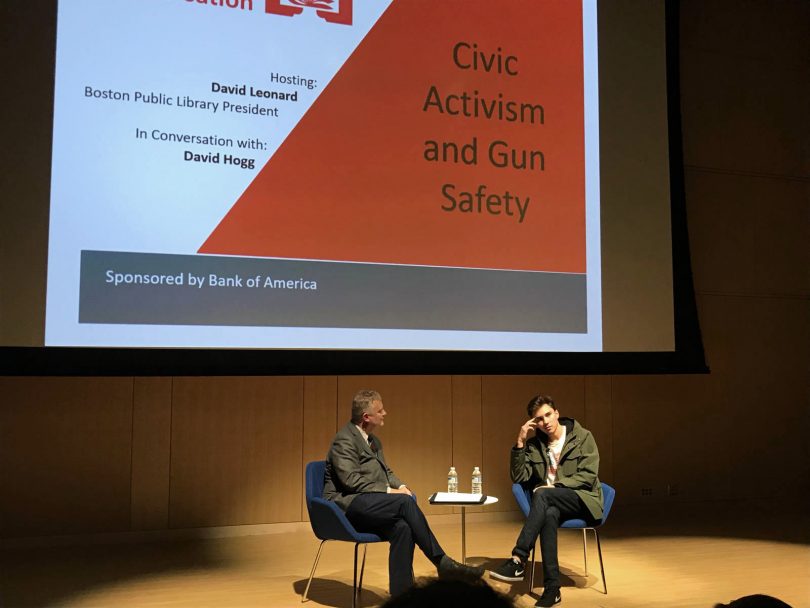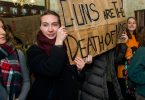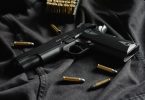By Haley Lerner
BU News Service
BOSTON — Gun safety activist and survivor of the Marjory Stoneman Douglas High School shooting David Hogg spoke at the Boston Public Library on Tuesday night about gun violence in the U.S.
Around 300 attendees filled Rabb Hall for the talk, titled “Public Conversation: David Hogg.” The event focused on the topics of civic activism and gun safety.
David Leonard, the president of BPL, hosted the event. Hogg, a survivor of the February 2018 attack by a gunman that killed 17 and injured 17, gave an opening speech and then spoke in conversation with Leonard. Hogg co-founded March For Our Lives, a student-led organization that advocates for tougher gun control in the US.
“He and a group of like-minded individuals started an organization, traveled across the U.S. and became a voice, if not the voice, of the intersection of responsible gun safety advocacy, voter registration and the youth voice in local and national politics,” Leonard said.
Hogg donned a white March for Our Lives shirt that displayed a barcode in the shape of the American flag that if scanned, leads directly to online voter registration. In his opening remarks, Hogg said gun violence is a problem that affects the entire country.
“If we recognize that the people that are affected by gun violence are not any one subgroup, it’s humans,” Hogg said, “we have to work together not as Americans, not just as different communities, but as human beings, to solve this issue.”
Hogg emphasized the importance of recognizing that many marginalized communities and people are underrepresented in the conversation surrounding gun violence and control. He said communities of color and of lower income often experience high rates of gun violence, but tend to receive less media coverage than white victims of gun violence such as himself.
The effect of gun violence on undocumented immigrants is also underrepresented in the media, according to Hogg. He said individuals who are undocumented who get shot do everything in their power to not go to a hospital, so they are not at risk of being catched by U.S. Immigration and Customs Enforcement.
“Who are we to say that your violence doesn’t matter because the fact of your zip code or the number of figures in your bank account?” Hogg said. “We should come together as a collective society to recognize that no matter where you come from, who you are, how much you make, or what color your skin is, the violence you face is unacceptable and we must face it together, because assault and violence in one community allows assault and violence in any community.”
In regards to representations of mass shootings in the media, Hogg said we need to treat mass shootings as we do airplane crashes, instead of as we do car crashes. Mass shootings should be seen as abnormal occurrences, Hogg said, and should not be quickly flushed out of the media circle.
Hogg also spoke about the influence of the National Rifle Association and how it funds politicians based on financial interests, not safety interests.
“When they say the only thing that can stop a bad guy with a gun is a good guy with a gun, they’re trying to sell you two guns,” Hogg said.
Throughout the event, Hogg emphasized the importance of voting to change current legislation.
“Violence is a disease that we can and will cure and the best cure is to vote,” Hogg said.
17-year-old Northeastern University student Nickhil Tekwhni said he found the talk incredible and appreciated Hogg’s emphasis on the need for everyone to vote.
“I think [voting is] probably the smallest but most impactful things someone can do to ensure that the movement is moving forward and not just at a halt,” Tekwhni said.
Maureen Trainor, 63, of Belmont, Mass. said she thought Hogg was articulate and felt he tried to emphasize the point that people need to go out and vote for morally sound representatives.
“I thought that he made a very good point about the difference in listening to respond versus listening to learn,” Trainor said. “And I feel that in these times when we have many people who don’t know how to listen at all, that there should be a distinction in the way you listen, is pretty significant.”
NEU student Alise Boal, 18, said she thought the event was powerful and covered important topics.
“I’ve followed March for Our Lives and what they’ve done throughout the whole movement and sort of the whole process but even then, having heard them talk about a lot of these things before, it was really powerful and really motivating,” Boal said. “Particularly to hear it in person from someone who’s been there and who has impacted the community so much.”





